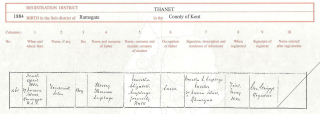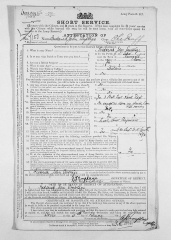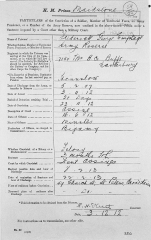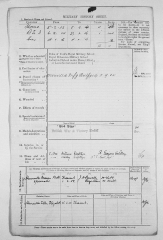Frederick John was born on the 10th April 1884, the son of Henry Thomas Emptage and Martha Elizabeth Emptage, formerly Walk, at 27, Sussex Street Ramsgate.
Frederick’s family life was complicated. He’d been born in Ramsgate but after the death of his younger twin brothers when he was four, the family had moved to Canterbury where his youngest brother, Alfred James, was born in 1887.
By 1889 the family had moved to the Bridge area. Martha was pregnant with her daughter Ellen, who was born in the October but sadly their son Alfred James died just three weeks later.
In July, in the same area, a Malbry Jane Wilson had given birth to a son Alfred George Wilson in Thanington, near Canterbury. From later school records, it seems he was the son of Henry Thomas Emptage.
Some time between the baptism of Ellen Lucy (baptised Ellen Louisa in January 1990) and the night of the 1891 census, the family spilt up.
Frederick, then aged age 7, and Ellen were with their mother Martha in Broadstairs, listed on the census as visitors. Martha was 35 and married. What isn’t noted is that Martha was pregnant again. With them was Frederick’s uncle, William John Emptage, a visitor, single and a bricklayer. William was the younger brother of Henry Thomas Emptage.
Henry was boarding in Thanington and with him were the older sons, Henry, 10, and William, 8. Henry described himself as a widower, aged 34, general labourer.
The family split was permanent but there was no divorce. Most people couldn’t afford the high fees at that time and simply moved away and set up home with their new partner, describing themselves as husband and wife.
Martha and William set up home together and had two children whilst also having Ellen with them and, we assume, Frederick. Henry Thomas and Malbry Jane Wilson had another four children, eventually settling in Hammersmith, London.
Sadly, within a few years, both of Frederick’s parents had died, Henry in November 1896 and Martha in March 1897. It must have been a devastating time for the children.
We know that Ellen had remained with her mother as she and her half sister continued to live with her uncle William when he married seven months after Martha’s death. Indeed, Ellen was referred to as his daughter in the 1901 census so it seems he and his wife unofficially adopted her. However, we have no idea where the three older children were living when their parents died.
But in 1897, Henry was 16, William was 14 and Frederick was coming up to 13. What effect did the split up of their family and their parents’ early death’s have on them at such young ages, particularly on Frederick. Did it have any bearing on his actions later in life?
By the end of 1897, the year, Henry had signed up for the army in 1897, lying about his age to get in early. William worked as a labourer in Dover before joining the army in 1900 when he was nearly 19. Both of them enlisted in the 3rd Battalion of The Buffs, East Kent Regiment.
Army Service
In 1901 Frederick was working as a butcher’s assistant, living with his employer and his family in Broadstairs. By 1902 he was working as a groom in Broadstairs when, aged 18 and 8 months and already serving in the militia, 1st Volunteer Battalion of East Kent Army, he applied to join the army as a full time soldier.
He took his oath in December 1902 at Dover and joined The Buffs on 5 February 1903 in Canterbury, giving his trade as butcher. Frederick signed up for 3 years with the Colours and 9 years in the Reserve. He transferred to 2nd battalion in May 1903.
His description on enlistment was: 5 ft 2 inches tall, weight 98 lbs, chest 30 inches, fresh complexion, grey eyes and light brown hair. He had a scar on the back of his right thumb. He was declared fit for service in the East Kent Regiment. After six months service and a gymnastic course he’d grown an inch taller, weighed 114 lbs and expanded his chest measurement to 33 6/8 inches.
The records include an undated military history sheet, which contains nothing but his next of kin, named as elder brother ‘Harry’, address unknown (which is not surprising as Henry was abroad in the army).
Private Frederick John Emptage, regiment number L/7150 took additional training in 1905 at Bulford Camp on Salisbury Plain in Wiltshire and passed instruction in mounted infantry, 3rd class.
The records show that, unlike his brothers Henry and William, Frederick spent all his army career in the UK until he was recalled when war broke out in 1914.
On 4 February 1906, three years after he had enlisted he returned to Dover, to the 1st Battalion of the East Kent Regiment. This was a volunteer militia battalion and so Frederick was back in the militia where he started. A year later he transferred to the army reserves. His transfer sheet records his experience as a butcher but states that, having been a groom to an officer for six months, he desired employment outside the army as a groom.
Marriage and…..
In March 1908 Frederick John Emptage age 23, married Henrietta Frances Webb, aged 28, in Thanet. He named William, the uncle who had fulfilled the role of stepfather, as his father. William had died less than nine months before Frederick’s marriage.
Frederick and Henrietta’s daughter, named Henrietta Ellen Elizabeth, was born in Thanet in March 1910.
Henrietta Frances, the daughter of William Webb, a house painter, and Henrietta Chipperfield was born on the 12th June 1879 in Poplar, London. In 1901, aged 21, Henrietta had been a domestic servant and living with her parents, at 9, Suffolk Street in Poplar.
In April 1911 Frederick, Henrietta Frances and their daughter Henrietta Ellen were still living in Thanet, at 59 Church Street, a few houses away from where he used to live with his mother Martha and William John Emptage.
All seemed normal but it seems they were not set for a life of wedded bliss.
In the second quarter of 1912, Frederick married Maud Emma Louise Pettman in Thanet. He again gave William as his father but there was an error in his own name, which was given as Frederick George instead of Frederick John. Three months after their marriage, Maud gave birth to a boy and named him Albert Frederick Emptage.
It was rather unfortunate as Frederick was still married to Henrietta at the time.
Maud discovered this and, after Frederick had been tried for bigamy and served his sentence, a summons was held against him for maintenance for Maud’s child. The case was reported in the East Kent Times 1 March 1913 under the headline:
HEARTLESS DECEPTION
Young Woman’s Painful Matrimonial Experience
Some strange revelations were made at the Margate Petty Sessions on Wednesday, in a case arising out of a summons heard against Frederick G [sic] Emptage, Church Street, St Peter’s, a married man, who was required to show cause why an order for the maintenance of the child of Maud Emma Louise PETTMAN, living in Hengist Avenue, Margate, should not be made upon him.
The magistrates on the Bench were:- The Mayor (Mr A Leon Adutt), in the chair; Messrs F J Bobby, W B Reeve and H N Fishwick.
Mr Shea who appeared for the complainant, said it was the most extraordinary case of the kind that he had ever had to lay before the Bench at that Court. As the defendant had pleaded that he had no cause to show, it would be necessary for him to deal briefly with the outlines, which were as follows :
Complainant lived with her mother at Hengist Avenue and she became acquainted with the defendant sometime previous to the year 1910. In the month of June in that year, she was in domestic service at Cliftonville and on a Sunday evening she met defendant along the seafront.
At his request, and by her consent, he accompanied her home; a friendship sprung up, which continued for a long time, and, as the defendant represented himself to the girl and to her mother as a single man, he was accepted as the girl’s prospective husband.
In the month of May 1912, owing to representations complainant made to the defendant, she was taken by him to the Registry Office at Minster, where a form of marriage was gone through.
Owing to the mother being busy, it was agreed that the defendant should, until after the season, continue to reside at what was supposed to be his lodgings at St Peters.
Being out of work, he got situations in Brighton and Sittingbourne as a Van Man, but stopped at neither place long, and, as he complained of being lonely, the complainant went to the address at St Peter’s, where, to her great amazement, she discovered that defendant was a married man with one child. As a result of that discovery, information was given to the police; defendant was arrested; tried for bigamy, and sentenced at the Assizes to three months hard labour.
In making the order, he (Mr Shea) said he would ask the Magistrates to take into consideration this mans heartless deception, to which he had pleaded guilty.
Defendant said he only came out of prison on February 8th; he was out of employment, and had not prospect of getting work. Having taken a false step, he found people did not seem to want to employ him.
The Mayor in making an order for payment of 4 shillings per week until the child, a boy, was fourteen years of age, said it was a case of very heartless deception.
Defendant would have to pay the costs, 10 shillings, or go to prison in default; and if he did not keep up the payments, the complainant could take out a warrant against him for his committal to prison.”
Still a reservist, Frederick’s army records show that the Civil Police had reported, on 16 June 1912, that Frederick had been given three months in jail at Maidstone for bigamy.
A report from Maidstone Prison, dated 3.12.12. refers to Frederick George [sic] Emptage, Army Reserve. It states that he had been convicted at the Assize Court of bigamy which had taken place at Minster. It was a felony and Frederick was sentenced to three months. His address was given as Church St, St Peters, Broadstairs.
Three days later a typed note was inserted in his records:
“Sir, For decision please as to whether this man should be discharged having been convicted of Bigamy. Character on transfer to Army Reserve, Very Good.”
Handwritten underneath it says “To continue in the Reserve” It was dated 6/12/12.
Frederick served his sentence at Maidstone Prison, from the 23rd November 1912 to the 8th February 1913 and was released a fortnight earlier for good behaviour.
We are not sure where Frederick went on release from prison but from the newspaper report it seems that Frederick had reurned to Henrietta in Church Street, St Peter’s.
World War One call up
Eighteen months later, with the outbreak of war, Frederick was mobilised on 5 August 1914. He was already qualified in mounted infantry and embarked with the 1st Battalion The Buffs as part of the British Expeditionary Force in September 1914.
Unfortunately there are no records for Frederick during his time in France and Belgium, but military records show that Frederick’s regiment was involved at the action at Aisne Heights and then later the Battle of Hooge. The Aisne River in North East France was crossed by troops on the 13th September 1914 and they dug in. This was one of the first battles that trench warfare was used.
The action at Hooge in Belgium took place over the 2 days of the 30th and 31st of July 1915. Hooge was the site of a chateau and was used as Divisional Headquarters for the area. The staffs from the 1st and 2nd Divisions were killed when the chateau was shelled on the 31st October 1914. Hooge is now the location of a war cemetery.
Private Frederick John Emptage was “discharged in consequence of termination of his period of engagement” at Canterbury on 4 February 1916, exactly thirteen years after he enlisted.
He had earnt three good conduct badges during his 13 years service and had been awarded the British Expeditionary Force medal and the 14 Star, British War and Victory Medals.
Frederick’s next of kin were given as his brothers William, R. Garrison Artillery and Harry, 3rd East Kent Regiment. William survived the war, being discharged at the end of his period of service in 1915 but Henry died in December 1917.
On discharge Frederick was 31 years, 2 months. His intended place of residence was in Poplar, London.
Marriage and…….
Evidently Henrietta had moved back to Poplar to be near her family during the war and Frederick joined her there. Their son Frederick Harold Emptage was born nine months later on the 7 November 1916. Four years later, in December of 1920, Henrietta Frances Emptage, passed away in Poplar, aged just 41.
Frederick was left with four year old son, Frederick Harold needing a mother.
And somewhere, his eight year old son Albert was living with his mother Maud, needing a father.
Of course, whilst his first marriage to Maud had been annulled, the court had ordered Frederick to pay Maud the sum of four shillings a week until their son Albert was 16 years of age. Presumably they had kept in contact with each other so that he could send the money.
Was it close contact?
Frederick and Maud married in Chelsea just a few months after Henrietta died. And this time it was legal.
The worst of cynics would say that Frederick and Maud had kept their liaison going, even after Frederick went back to his wife Henrietta. Some would say so… but I couldn’t possibly comment.
Frederick John Emptage died on the 11th June 1934 age 50. He was living at Tower Hamlets in the east end of London at the time of his death, and the cause of death was pulmonary tuberculosis.
Maud Emma Louise Emptage out lived Frederick by 49 years and never remarried. She died in Hackney London, in March 1983, at the grand old age of 91.
David Lindsey Emptage
The role of the family historian is to present the facts and, whilst we may draw conclusions, we do not judge. We were not there, we cannot know what was truly happening for people.
However, whilst not seeking to excuse Frederick’s bigamy, I do feel sorry for him and, of course, for his two wives.
By the time Frederick was 13, he had moved from Ramsgate to Canterbury, from there to Thanington and then to Broadstairs when his parent split up.
He had experienced the death of three of his siblings and his parents. Frederick was just two when the twins died and I wonder if he got much attention with sick babies in the house. And then the next baby was ill and died when Frederick was 5½, which he would remember.
One can but imagine that the grief in the household was tangible and may have been responsible for the break up of his parents’ marriage, with each parent seeking comfort elsewhere.
Then Frederick found himself living in Broadstairs with his mother and his uncle William John (who must have provided some sort of father role) for a few years before his mother died. And, of course, we don’t know what happened to Frederick when his mother died. Did he stay with William John, as his sister did, or was he kicked out of the house?
We can only wonder at the effect of it all on him. When he married Henrietta and then became involved with Maud at the same time that Henrietta was pregnant, was he simply looking for love, affection and security which he hadn’t experienced as a child? And then, when matters spiralled out of control, with Maud pregnant and, perhaps under duress from both Maud and her mother, he found himself entering into a bigamous marriage with her.
It is clear that bigamy cannot be excused but we can seek to understand what happened. I have the sense that Frederick was not ‘a cad and a bounder’ as bigamists were normally portrayed but was a good person though ill equipped to deal with emotional happenings.
Susan Morris
Notes
Henrietta Ellen Elizabeth Emptage, daughter of Frederick John and Henrietta Frances remained a spinster all her life. She died aged 74, in December 1984 in Havering Essex.
Frederick Harold Emptage, son of Frederick John and Henrietta Frances was married to Alma I. Smith for 43 years. He passed away age 82, in Hammersmith, London in July 1999.
Albert Frederick, son of Frederick John Emptage and Maud Emma Louise Pettman was married to Eileen Spillard for 31 years and they had a son Michael John Emptage. Albert died in December of 1977 age 65 and his son died in 1997.
David says: My maternal grandfather Edward Charles Mills Morris was a warder in Maidstone Prison at this time, and I wonder if he knew Frederick.






